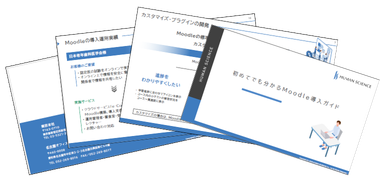2023.03.02
2024.08.06
Benefits and Considerations of Moodle Cloud Services

1. Overview of Moodle

Moodle is a free, open-source all-in-one learning platform. As of February 2023, according to statistics from Moodle HQ, there are over 160,000 sites and more than 300 million users across 240 countries and regions. It has truly become the largest learning platform in the world. It holds the number one share in universities in Europe and Japan. In addition, it is widely adopted not only in educational settings but also by global companies, government agencies, and other organizations around the world.
A major feature is the availability of plugins developed by developers around the world. A plugin is a program that adds functionality to software. You can find features tailored to the needs of learners, administrators, and participants from a rich selection of plugins. Please check the following official Moodle site.
> https://moodle.org/plugins/
Additionally, it comes with user-friendly editors (HTML editor, Atto editor), allowing for easy incorporation of images and videos, making it simple to create teaching materials. Furthermore, it is compatible with smartphones and tablets, enabling participants to comfortably attend lectures anytime and anywhere without being restricted by location.
The main reason Moodle continues to be chosen worldwide is that it is a world-standard LMS (Learning Management System), which has been refined and standardized by universities and other organizations around the globe. By using a world-standard system and implementing organizational reforms tailored to the system, it becomes possible to reassess the structure and nature of the organization, thereby enhancing international competitiveness.
For more details, please see the links below.
> [Moodle Basic Course] What is Moodle?
> [Moodle Basic Course] What can you do with the Moodle e-learning management system?
> [Moodle Basic Course] What can be done with Moodle's default features?
*1 LMS stands for Learning Management System. LMS is a system that centrally manages information such as learners, materials, progress, and grades necessary for e-learning.
2. On-Premises and Cloud

There are two main ways to implement Moodle: "on-premises" and "cloud". A brief overview of each is as follows.
■On-Premises
This refers to the method of installing IT resources such as servers, network equipment, and packaged software within the company or data center, where users manage and operate them themselves.
Benefits:
- ・It can operate on a closed internal network that is not connected to the internet. This is effective when you do not want to share information with external networks.
- ・You can prioritize your company's convenience when implementing or operating the system.
Disadvantages:
- ・It is not easy to adjust hardware and infrastructure in response to fluctuations in the number of users.
- ・It is necessary to have hardware as company assets, so it needs to be managed with asset ledgers and such.
- > Personnel familiar with the system will be required for implementation, operation, and maintenance. (Technical knowledge of servers is necessary, such as hardware specification selection and middleware installation, and users must also take security measures themselves).
■Cloud
It is the use of IT resources provided by cloud vendors over a network. You will pay fees based on your usage.
Benefits:
- ・You can utilize hardware and infrastructure according to data volume and access frequency. Additionally, it is easy to scale the system up or down as needed.
- ・There will be no need to hold the system as a company asset, so it will no longer be managed in an asset ledger.
- ・All server management will be handled by the provider.
- ・Major IT companies such as Amazon, Google, and Microsoft that provide cloud services offer products with particularly high security. Therefore, there are fewer security risks, allowing for safe use in business operations.
Disadvantages:
- ・Since applications and data will be placed outside the company, if the cloud services being used suffer from cyber attacks, there is a possibility of information leakage. This is the same as on-premises, and it is necessary to be aware that the same risks exist.
The benefits and precautions of implementing in the cloud will be explained in detail in the next chapter.
Instead of owning hardware and infrastructure, more and more companies are contracting cloud services and installing Moodle along with the necessary middleware on top of it. Additionally, some providers offer a package service that provides a seamless experience from contracting cloud services to implementing Moodle. In such cases, you will be able to receive the following services together.
- ・Operation and maintenance of Moodle (regular version upgrades, vulnerability response, handling during failures)
- ・Installation of plugins (additional features) for Moodle
- ・Support for inquiries on how to use Moodle (phone and email)
- ・Overall system operation and maintenance
* Please check as the service contents may vary by provider.
3. Benefits and Considerations of Moodle Cloud

We will explain the benefits and considerations of implementing Moodle as a cloud service. Here, we assume the use of cloud services as a package that includes the Moodle application.
<Merits>
- ・Maintenance: Since cloud services are operated and maintained by the provider, the implementing party does not need to perform software version upgrades or backups.
- ・Increase and Decrease of System: The cloud environment can increase resources as needed, allowing for immediate response to an increase in the number of participants. For example, it is possible to double the specifications only in May and November when the number of participants increases. Additionally, starting with around 100 users at the beginning of operations, it can easily accommodate a request to increase to 1,000 users after one year of operation, and eventually support 10,000 users in the future.
- ・Cost: Cloud services are used as needed, so they incur costs based on the number of users rather than fixed costs. Considering the labor involved, including operation and maintenance costs, it can be kept at a low price. Additionally, while on-premises solutions require significant costs at the time of setup, cloud services allow for costs to be averaged out by paying monthly or annually for usage.
- ・Security: It is said that recent cloud services provide higher security compared to before. The number of users utilizing highly confidential data, such as user information and lecture materials, is also increasing. Additionally, in a cloud environment, automatic backups are taken, which reduces the risks of data loss or corruption.
- ・OS and Middleware: In the case of on-premises, you need to determine the timing for upgrading the OS and middleware yourself, but with cloud services, the vendor will determine the best timing for you. Additionally, in on-premises setups, the vendors for the OS, middleware, and applications may differ, requiring coordination between vendors. However, with cloud services, since the cloud and applications are provided together, you only need to request from one company.
- ・Server Environment: In on-premises setups, it is necessary to prepare the location and air conditioning for the server, but this is not required with cloud services. Additionally, since purchasing and installing servers is not necessary, it becomes easier for application vendors to implement.
Furthermore, in on-premises setups, customer presence is required during installation on the customer's premises, and coordination with the customer's facilities department is also necessary.
:Notes:
- ・Selection of Providers: Since cloud services are offered by numerous providers, it is important to check the service details such as security, maintenance, and support when choosing a provider. We have detailed information about Moodle's security measures in the article below, so please take a look if you are interested.
> [Moodle Basic Course] Moodle's Security Measures - ・Impact of Maintenance: If the cloud service is stopped for maintenance or other reasons, it will be affected. Additionally, updates to the OS or middleware will occur at the time determined by the cloud service, so in that case, it is necessary to comply with the system's downtime.
- ・Customization: Cloud services generally have limitations on customization, which may prevent them from meeting specific needs. Therefore, it is important to consider customization requirements before implementation and choose the appropriate provider. In the case of Moodle, since it is open source, customization can be done freely.
- ・Data Storage Location:We sometimes hear concerns about not wanting to disclose information about products developed in-house. When using cloud services, it is necessary to verify the nature of the data.
- ・Usage Period:Cloud services generally require a contractual period, so at the end of the usage period, it is necessary to carry out data migration and termination procedures. It is important to confirm whether there are means to do so.
- ・Contract Terms: Cloud services vary in content and usage fees depending on the contract terms, so it is important to check the contract terms and make the appropriate choice.
The above assumes the introduction of a new system, but switching an existing system from on-premises to the cloud can also provide many benefits similar to a new implementation. In that case, it is necessary to pay attention to the following points as well.
- ・Carefully consider whether the requirements of the existing system match the cloud
To achieve cost reduction, which is a benefit of the cloud, it is crucial to thoroughly identify the current system requirements. It is advisable to consider security requirements, operational management, and how to integrate with other internal systems in advance.
Below are four representative examples of cloud services. Please use them as a reference.
AWS
AWS stands for "Amazon Web Services," which is provided by Amazon. The service started in 2006 and holds the number one global market share in the cloud at 33%.
Microsoft Azure
Microsoft Azure is a cloud service provided by Microsoft. It offers over 600 services in total, including SaaS, PaaS, and IaaS, and supports many programming languages, tools, and frameworks from both Microsoft and third parties.
GCP
GCP stands for "Google Cloud Platform," which is a cloud service provided by Google. It holds a global market share of 10%, ranking third in the cloud sector. The same infrastructure is used for end-user services such as Google Search and YouTube.
Sakura Cloud
Sakura Cloud is an IaaS-type cloud that offers a variety of services such as servers and storage. It has a proven track record across a wide range of industries, including as an infrastructure foundation for internet services and for large corporations and public institutions' business systems.
4. Summary

In the previous chapter, we discussed the benefits and considerations of implementing Moodle in the cloud.
Of course, it is possible to operate Moodle on your own, but to make the most of Moodle, it is advisable to seek the assistance of an official Moodle partner.
There are several official Moodle partners in Japan, and we would like to introduce Human Science Co., Ltd., which has a wealth of experience.
4-1. What is Human Science?
Human Science is an official partner of Moodle. In 2017, we were certified by the Moodle headquarters in Australia and became an official Moodle partner. Only companies with expertise and proven results in Moodle construction and development are certified. While certified companies exist worldwide, there are only a few in Japan.
Utilizing the know-how we have cultivated and our number one domestic operational track record (over 700 projects, more than 80 cases with companies, schools, and organizations), we provide total solutions from Moodle implementation to operational support.
4-2. What is the Moodle Cloud Package "e-CoreLea"?
e-CoreLea is a cloud service for Moodle provided by Human Science, requiring no preparation of the infrastructure environment. It is, of course, a package service that includes not only no initial setup but also support for Moodle version upgrades and backups after the service starts.
You can use an environment where Moodle is already installed and configured, so there is no need for customers to prepare or build servers, networks, or perform installation and initial setup.
・Features of the Moodle Cloud Package "e-CoreLea"
- 1. Safe Operation
We utilize a major foreign-affiliated company's cloud for the stable operation of Moodle. We also accommodate the expansion of the cloud environment during peak access times. - 2. Version Upgrade and Backup Support
We perform regular backups to ensure data preservation. We will upgrade Moodle for feature enhancements and security updates.
> Moodle Version Upgrade Service - 3. Reduced Implementation Costs
The cloud-based e-CoreLea allows for operation while keeping initial costs and expenses low. For example, the light plan that supports up to 200 users is available for a monthly fee of 41,600 yen. Additionally, we offer plans tailored to your usage, such as the standard plan, video distribution plan, and plan including educational content. For detailed pricing, please see here.
> Moodle Cloud Service - 4. Short Implementation Period
We have prepared plans assuming general use. Early usage is possible.
* Light Plan, Standard Plan - 5. Low Management Burden
All server management, including server specification selection, response to server aging, and troubleshooting, is handled by our company, reducing the burden on customer administrators.
Related Columns Here
> Cloud Services for Growing Demand in e-Learning Systems (Moodle, Totara)
Next, we will explain the services provided by Human Science step by step.
4-3. Implementation Design
<Client Situation Hearing and Proposal>
We provide support for Moodle configuration to realize the educational flow that our clients want to implement.
Moodle has a wealth of features, so we will make it user-friendly for learners by anticipating how it will be used. The configuration of Moodle allows you to show/hide features.
- ・Requirements Definition
We will listen to what the customer wants to achieve with the introduction of e-learning and finalize the specifications. - ・Support for Building e-Learning Operation Business Processes
e-Learning operations involve various tasks such as course registration, communication with users, distribution, and effectiveness measurement. We assist in constructing business flows to ensure the success of implementation and operation. - ・Building a Demo Site
We will launch a demo site and tune the settings and features while allowing customers to see the actual operation of Moodle.
<Moodle Construction>
We will install Moodle and make it ready for use.
We can build it on-premises (owned and operated by your company) as well as on cloud platforms such as AWS, Microsoft Azure, and GCP.
We also perform replacements from your existing systems to Moodle.
- ・Selection of Hardware Specifications
Determined by the number of users and how it is used. - ・Middleware Installation
Install open-source middleware such as Apache (Nginx), PHP (php-fpm), and PostgreSQL. - ・Moodle Installation
- ・Moodle Configuration
We will configure Moodle based on the intended use.
For service details, click here
> Moodle Construction - ・Customization and Plugin Development
We will develop custom features and plugins that are difficult to achieve with Moodle's standard functionality.
For more details about the service, click here
> Moodle Plugin Customization
We also offer a cloud service called e-CoreLea.
e-CoreLea is a cloud service package for Moodle provided by Human Science, requiring no preparation of infrastructure. Of course, there is no need for initial setup, and the package service includes support for Moodle version upgrades and backups after the service starts.
You can use an environment where Moodle is already installed and configured, so there is no need for customers to prepare or build servers, networks, or perform installation and initial setup. We also have plans that include video distribution and educational content. Please feel free to contact us via the link below.
> Moodle Cloud Service (e-CoreLea)
Related Columns Here
> Cloud Services for Growing Demand in e-Learning Systems (Moodle, Totara)
4-4. Operational Support
<Usage Seminar>
We will hold a seminar on the basic usage of Moodle.
It is expected to be in a lecture format using a web conferencing system (such as Zoom) for about 5 hours a day.
The content of the explanation includes preparation, user registration, course registration, quiz creation, downloading grades, and creating surveys.
<Operation Manual>
We provide a tutorial manual on how to use Moodle.
For details about the service, click here
> Moodle Implementation, Seminars, Manuals
<Regular Maintenance (Version Upgrade)>
Moodle has many versions available. Human Science supports version upgrades.
For service details, click here
> Moodle Version Upgrade
<Inquiry Support>
We provide Moodle support services via phone and email.
The biggest advantage of Moodle is that it is open source and free, but the operation and maintenance are the user's responsibility.
The main contents include the following.
- ・Phone and email support for inquiries regarding Moodle operations
- ・Delivery of a report summarizing the inquiry details as a monthly report
- ・Investigation into the cause of the Moodle bug (fix will be handled separately)
We provide support for Moodle operations and management, as well as regular maintenance such as frequent Moodle updates, server environment upgrades, and new information about new features.
For details of the services, click here
> Moodle Maintenance and Operation
From the above, it is clear that Human Science provides support from the introduction to the operation of Moodle. For those who would like to know more details, you can obtain the materials from the link below.
Human Science offers a variety of services to help our clients implement and operate e-learning.
If you have any concerns, please feel free to contact us.
> e-learning material production
> e-learning material translation
> in-house material support
> Articulate Storyline, Studio implementation support and creation agency services
> microlearning implementation support
> Flash to HTML5 migration and conversion
> Moodle and Totara Learn (open-source LMS) implementation and operational support
For the contact form, click here(https://hs-learning.jp/contact/)
Moodle Introduction Guide for Beginners

We explain the process of introducing and operating Moodle.
For the introduction and operation of Moodle, please leave it to Human Science, the official partner. We also introduce many achievements in Moodle implementation support.
Projects: Over 866
Companies, Schools, Organizations: Over 80 cases












